Science
www.olympiadsuccess.com
Chapter 12: Electricity and Circuits
Class: VI
Exemplar Solutions
Multiple Choice Questions
Question 1
Choose from the options a, b, c and d given in Fig. 12.1 the figure which shows the correct direction of current.
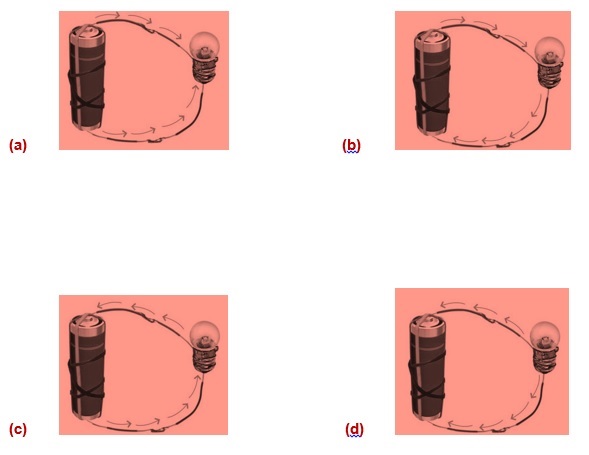
Fig.12.1
Answer
(b)
Question 2
Choose the incorrect statement.
(a) A switch is the source of electric current in a circuit.
(b) A switch help to complete or break the circuit.
(c) A switch helps us to use electricity as per our requirement.
(d) When the switch is open there is an air gap between its terminals.
Answer
(a)
Question 3
In an electric bulb, light is produced due to the glowing of
(a) the glass case of the bulb.
(b) the thin filament.
(c) the thick wires supporting the filament.
(d) gases inside glass case of the bulb.
Answer
(b)
Question 4
In the following arrangement shown in Fig. 12.2, the bulb will not glow if the ends A and B are connected with
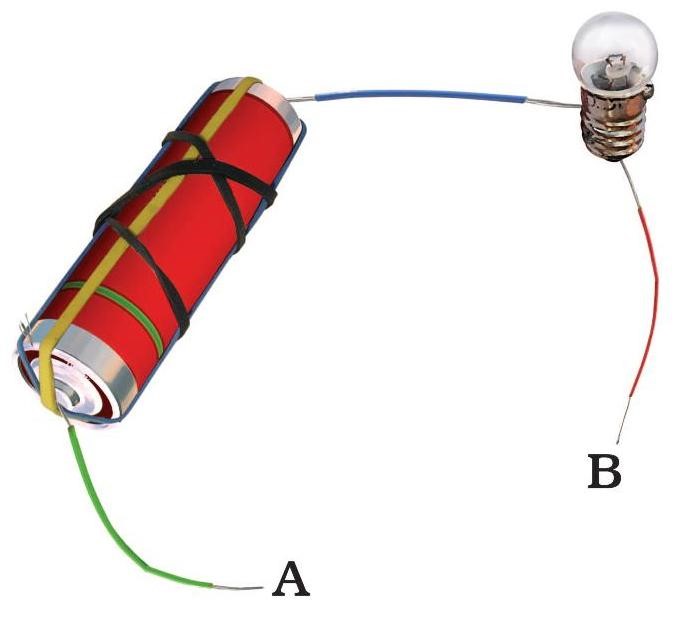
Fig.12.2
(a) A steel spoon
(b) A metal clip
(c) A plastic clip
(d) A copper wire
Answer
(c)
Question 5
In the circuit shown in Fig. 12.3, when the switch is moved to ‘ON’ position,
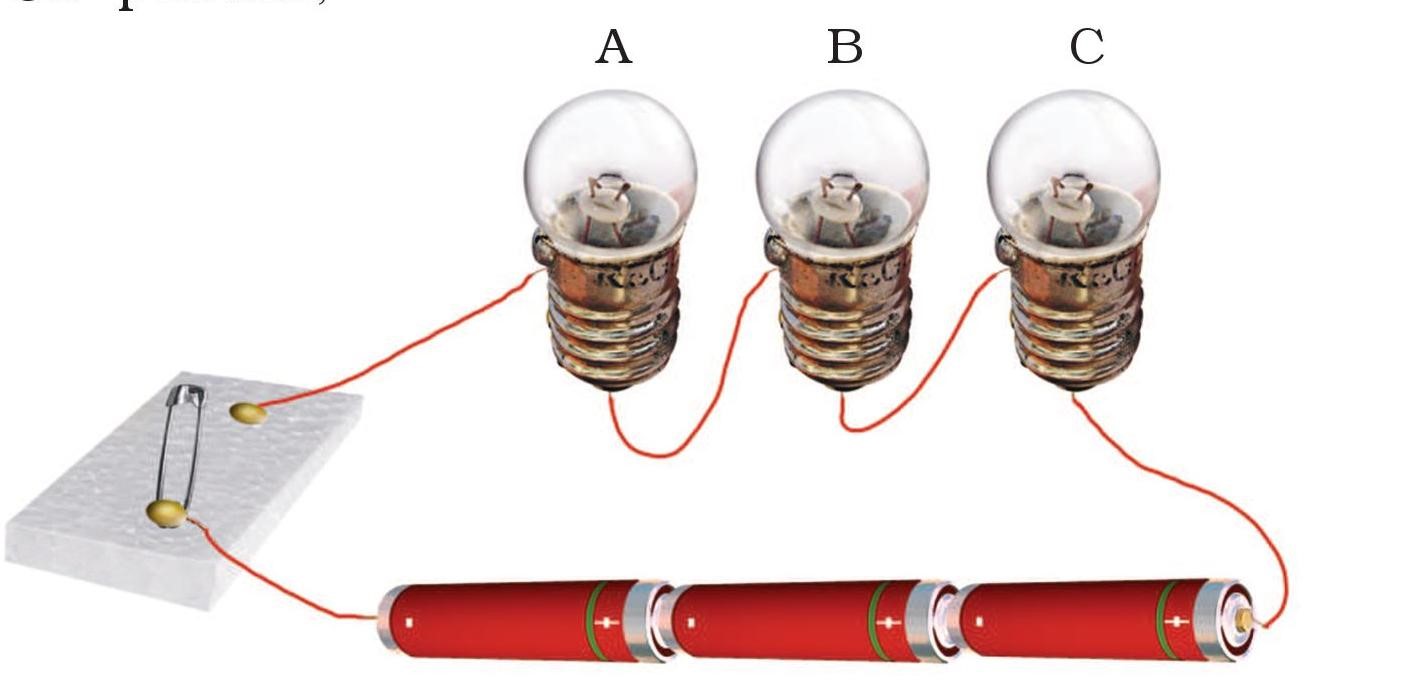
Fig.12.3
(a) the bulb A will glow first.
(b) the bulb B will glow first.
(c) the bulb C will glow first.
(d) all bulbs will glow together.
Answer
(d)
Question 6
Filament of a torch bulb is
(a) a metal case.
(b) metal tip at the centre of the base.
(c) two thick wires.
(d) a thin wire.
Answer
(d)
Question 7
Paheli is running short of connecting wires. To complete an electric circuit, she may use a
(a) glass bangle.
(b) thick thread.
(c) rubber pipe.
(d) steel spoon.
Answer
(d)
Very Short Answer Questions
Question 8
In which of the following circuits A, B and C given in Fig. 12.4, the cell will be used up very rapidly?
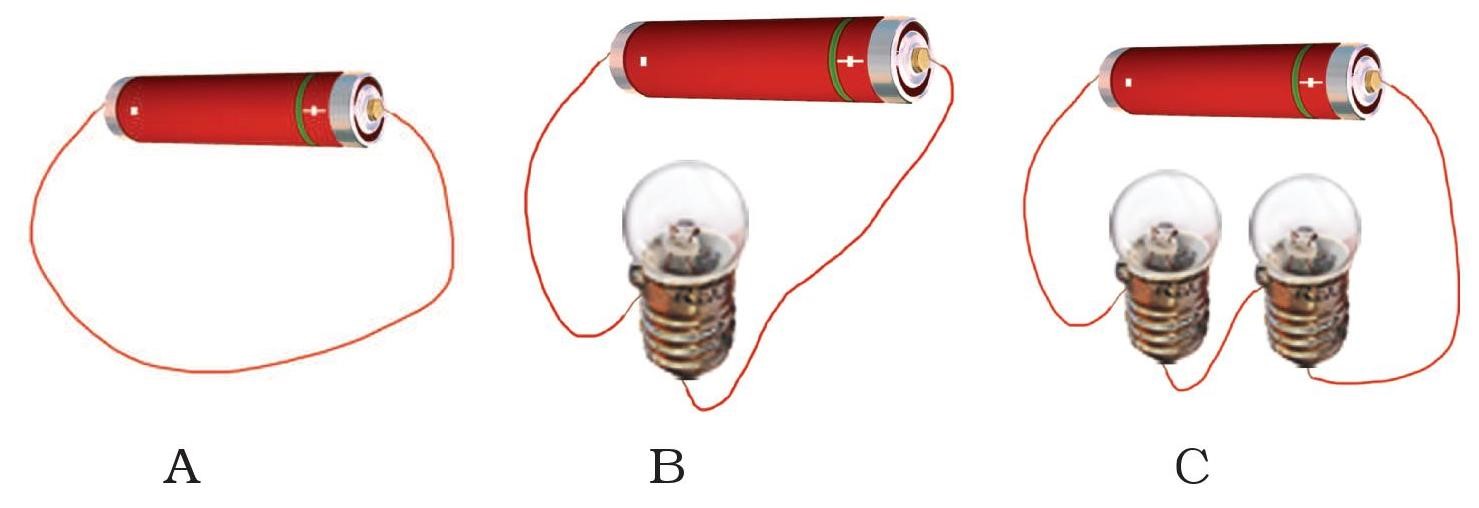
Fig.12.4
Answer
In circuit A the cell will get used up rapidly.
Question 9
Fig. 12.5 shows a bulb with its different parts marked as 1, 2, 3, 4 and 5. Which of them label the terminals of the bulb?
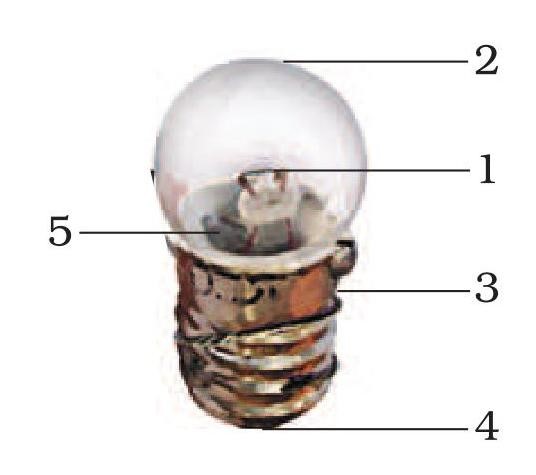
Fig.12.5
Answer
Labels 3 and 4 mark the terminals of the bulb.
Short Answer Questions
Question 10
You are provided with a bulb, a cell, a switch and some connecting wires. Draw a diagram to show the connections between them to make the bulb glow.
Answer
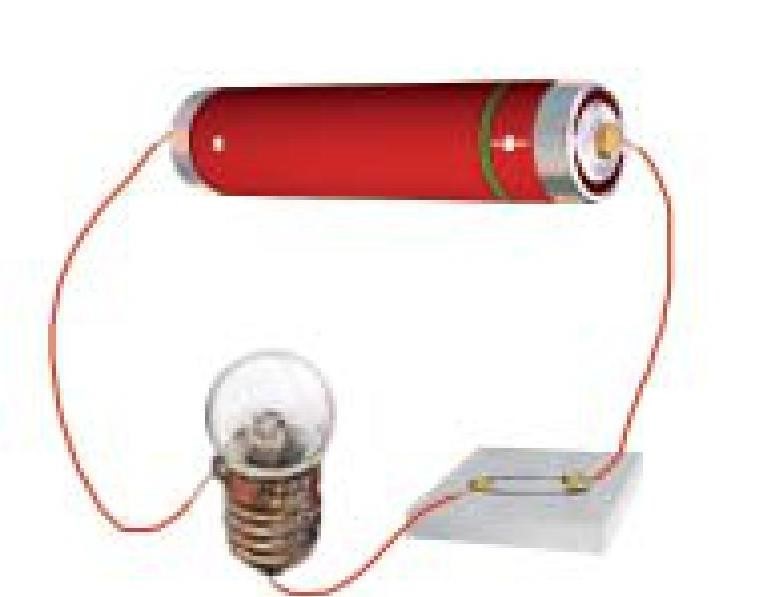
Question 11
Will the bulb glow in the circuit shown in Fig. 12.6? Explain.
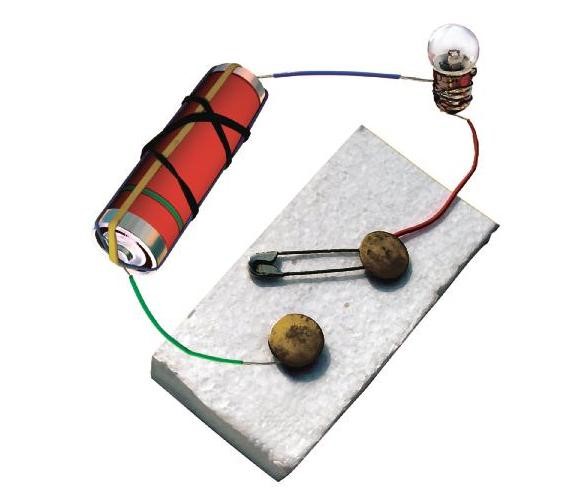
Fig.12.6
Answer
No the bulb will not glow in this circuit because the switch is open and the circuit is incomplete.
Question 12
An electric bulb is connected to a cell through a switch as shown in Fig. 12.7. When the switch is brought in ‘ON’ position, the bulb does not glow. What could be the possible reason/s for it? Mention any two of them.
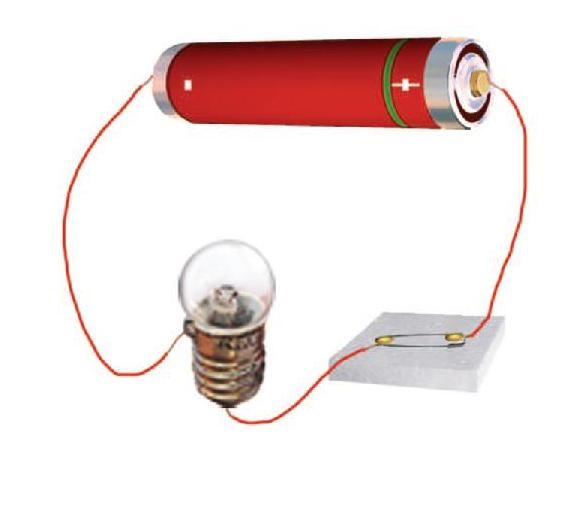
Fig.12.7
Answer
The following could be the possible reasons:
(i) the bulb is fused.
(ii) the cell is a used one.
(iii) break in connecting wire.
(iv) loose connection.
Question 13
A torch requires 3 cells. Show the arrangement of the cells, with a diagram, inside the torch so that the bulb glows.
Answer

Question 14
When the chemicals in the electric cell are used up, the electric cell stops producing electricity. The electric cell is then replaced with a new one. In case of rechargeable batteries (such as the type used in mobile phones, camera and inverters), they are used again and again. How?
Answer
Rechargeable batteries can be recharged by providing them appropriate current.
Question 15
Paheli connected two bulbs to a cell as shown in Fig. 12.8.
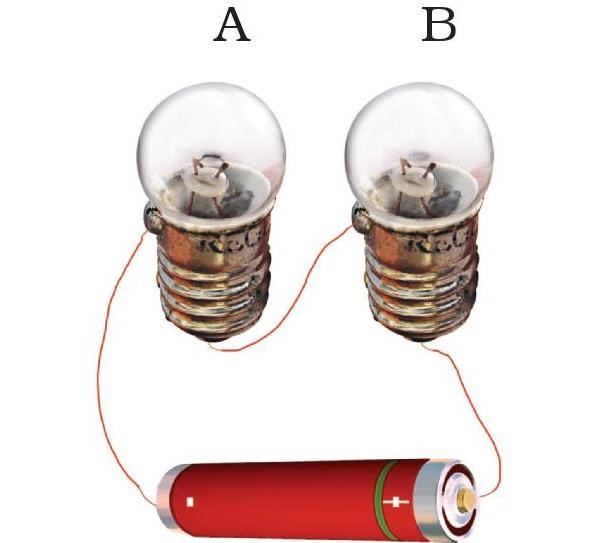
Fig.12.8
She found that filament of bulb B is broken. Will the bulb A glow in this circuit? Give reason.
Answer
No, Bulb A will not glow as the circuit will become incomplete.
Question 16
Why do bulbs have two terminals?
Answer
Bulb has two terminals to connect the filament with the circuit so that the current can pass through it.
Question 17
Which of the following arrangement A, B, C and D given in Fig. 12.9 should not be set up? Explain, why.
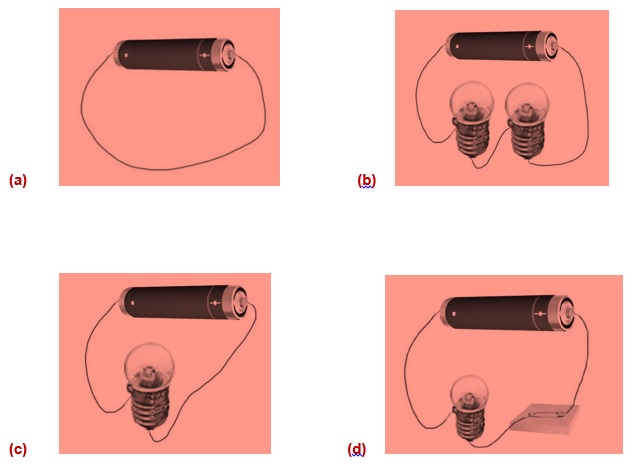
Fig.12.9
Answer
Arrangement A is not desirable and should not be set up. This will exhaust the cell very quickly.
Question 18
A fused bulb does not glow. Why?
Answer
In a fused bulb the filament is broken and thus making the circuit incomplete.
Question 19
Paheli wanted to glow a torch bulb using a cell. She could not get connecting wires, instead, she got two strips of aluminum foil. Will she succeed? Explain, how?
Answer
Yes. Aluminum foils can act as connecting wires.
Long Answer Questions
Question 20
Boojho has a cell and a single piece of connecting wire. Without cutting the wire in two, will he be able to make the bulb glow? Explain with the help of a circuit diagram.
Answer
Yes, using the arrangement given below he can succeed in getting the bulb glow.
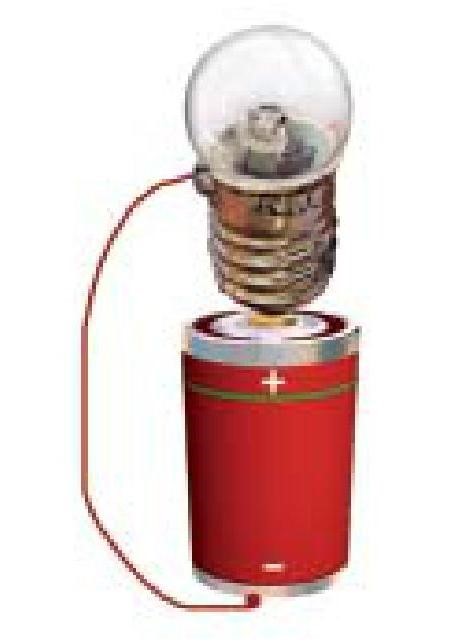
Question 21
Fig. 12.10 A and B, show a bulb connected to a cell in two different ways.
(a)
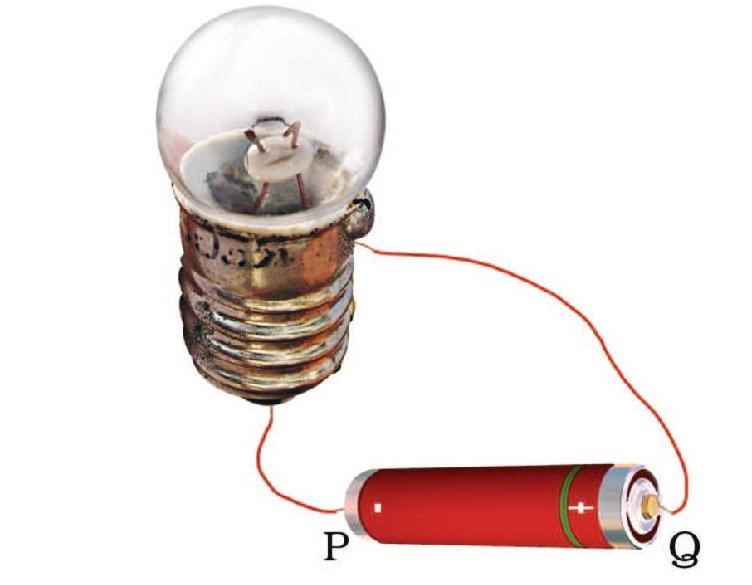
(b)
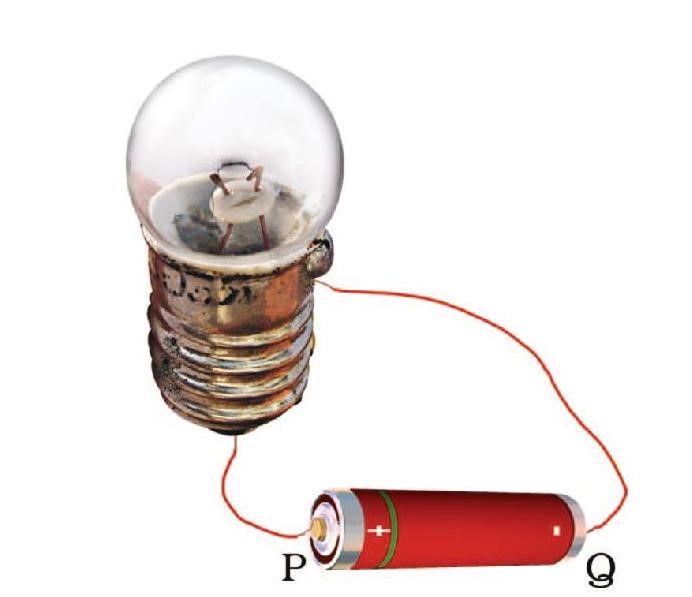
Fig.12.10
(i) What will be the direction of the current through the bulb in both the cases. (Q to P or P to Q)
(ii) Will the bulb glow in both the cases?
(iii) Does the brightness of the glowing bulb depend on the direction of current through it?
Answer
(i) In Fig. (a) Q to P
In Fig. (b) P to Q
(ii) Yes
(iii) No
Question 22
Think of six activities which use electric current. Also name the devices used to perform the activity.
Activity you perform Device
Example : Get light Torch
___________ --------------
___________ --------------
___________ --------------
___________ --------------
___________ --------------
Answer
Activity you perform Device
Get light Torch
Heat water Geyser/immersion rod
Make toast Toaster
Cook food Heater/microwave
Listen to music CD player/radio/i-pod
Question 23
A torch is not functioning, though contact points in the torch are in working condition. What can be the possible reasons for this? Mention any three.
Answer
The possible reason could be
(i) the bulb may be fused.
(ii) the cells may have been used up.
(iii) the cells are not placed in the correct order.
(iv) the switch is faulty.
Yearlong program for Olympiads preparation & to build necessary skills for future.
Explore More
Time to mark your calendar with the upcoming Olympiads exam schedule.
Explore More
Take your Olympiad preparation to next-level by taking LIVE Classes.
Explore More
Assess your performance by taking topic-wise and full length mock tests.
Explore More
Online tuitions for international compeitions like SASMO, SEAMO, etc for Grades 1-11.
Explore More